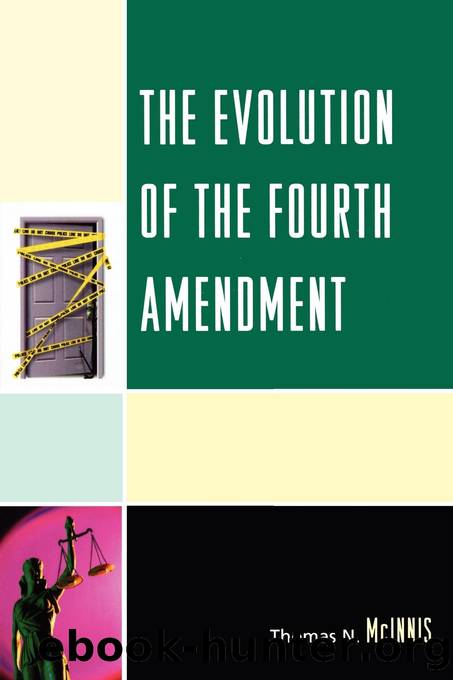The Evolution of the Fourth Amendment by McInnis Thomas N.;

Author:McInnis, Thomas N.;
Language: eng
Format: epub
Publisher: Lexington Books
Published: 2009-08-15T00:00:00+00:00
In limited circumstances, where the privacy interests implicated by the search are minimal, and where an important governmental interest furthered by the intrusion would be placed in jeopardy by a requirement of individualized suspicion, a search may be reasonable despite the absence of such suspicion. We believe this is true of the intrusions in question here.159
Applying the reasonableness standard the Court had no problem, despite the lack of individualized suspicion required by the program, accepting the part of the regulation involving blood testing which it compared to the mandatory blood tests for people suspected of driving while intoxicated. It found it even easier to rule in favor of breath tests which involved less bodily invasion than the blood tests. The Court was bothered by the urine tests due to the greater privacy interests at stake. Despite these concerns, Justice Kennedy noted that providing a urine sample, unlike a blood test, involved no penetration of the body nor did it have to be directly observed by another person. Furthermore, the Court pointed out that the procedures adopted in the regulations tried to limit the intrusiveness of the urine tests as much as possible and therefore ruled in favor of the policy. Overall, the Court found the drug testing program was acceptable because personal expectations of privacy were diminished in such a widely regulated industry. Balancing the reduced privacy expectation of the railroad worker against what the Court called the compelling governmental interest of insuring railroad safety led the Court to favor the governmental interest. The Court added that using a tougher standard such as requiring a warrant or individualized suspicion would impede the governmentâs ability to both detect and deter drug use among railroad employees.
Justice Marshall dissented in Skinner. He noted his disappointment that in its zeal to combat drug abuse the majority had discarded the heart of the Fourth Amendment, the warrant and probable cause requirements, as being impractical in favor of a flexible special needs approach that relied on a balancing of interests to determine if a search was reasonable. Justice Marshall pointed out that this case was different from previous cases which had used a balancing approach because it involved the direct search of a person, not their possessions. It also allowed use of the special needs rationale to justify a search when there was no individualized suspicion. Tying together his reasoning Justice Marshall chided the majority stating: âConstitutional requirements like probable cause are not fair-weather friends, present when advantageous, conveniently absent when âspecial needsâ make them seem not.â160
The impact of Von Raab and Skinner was that it once again enlarged the Courtâs view of what constitutes a special need of government to include maintaining the integrity of customs agents and expanding safety of the rail system. The rationale of Justice Kennedyâs opinion, like that of Chief Justice Warrenâs in Terry, used a flexibility that invited further expansion. It invites an unlimited use of future governmental claims to special needs and the Court applying the balancing approach of reasonableness.
Download
This site does not store any files on its server. We only index and link to content provided by other sites. Please contact the content providers to delete copyright contents if any and email us, we'll remove relevant links or contents immediately.
Constitutional Law by Erwin Chemerinsky;(171)
Sentencing and Artificial Intelligence by Ryberg Jesper;Roberts Julian V.;(158)
European Witch Trials (RLE Witchcraft) by Richard Kieckhefer(154)
Solve Your Money Troubles by Amy Loftsgordon;Cara O'Neill;(154)
Roman Law and Economics by unknow(138)
Dictionary of American Criminal Justice by Dean J. Champion(135)
Juvenile Risk and Needs Assessment by Christopher J. Sullivan Kristina K. Childs(133)
A Constitution for the Living by Beau Breslin(131)
Policing the Police : Knowledge Management in Law Enforcement by Petter Gottschalk(131)
Incarceration without Conviction by Mikaela Rabinowitz(130)
Zionism, Palestinian Nationalism and the Law: 1939-1948 by Steven E Zipperstein(127)
The Eternal Criminal Record by James B. Jacobs(126)
The Legal Guide for Museum Professionals by Courtney Julia;(125)
The Supreme Court's Role in Mass Incarceration by William T. Pizzi(123)
Crime and the Life Course by Michael L. Benson(122)
Law for Student Police Officers by Merritt Jonathan;(118)
Lawyers, Lead On by Williford Rebecca S.;Basas Carrie A.;Enyart Stephanie L.;(116)
Juvenile Homicides : A Social Disorganization Perspective by Minna K. Laurikkala(112)
Revitalizing Victimization Theory by Travis C. Pratt Jillian J. Turanovic(110)
